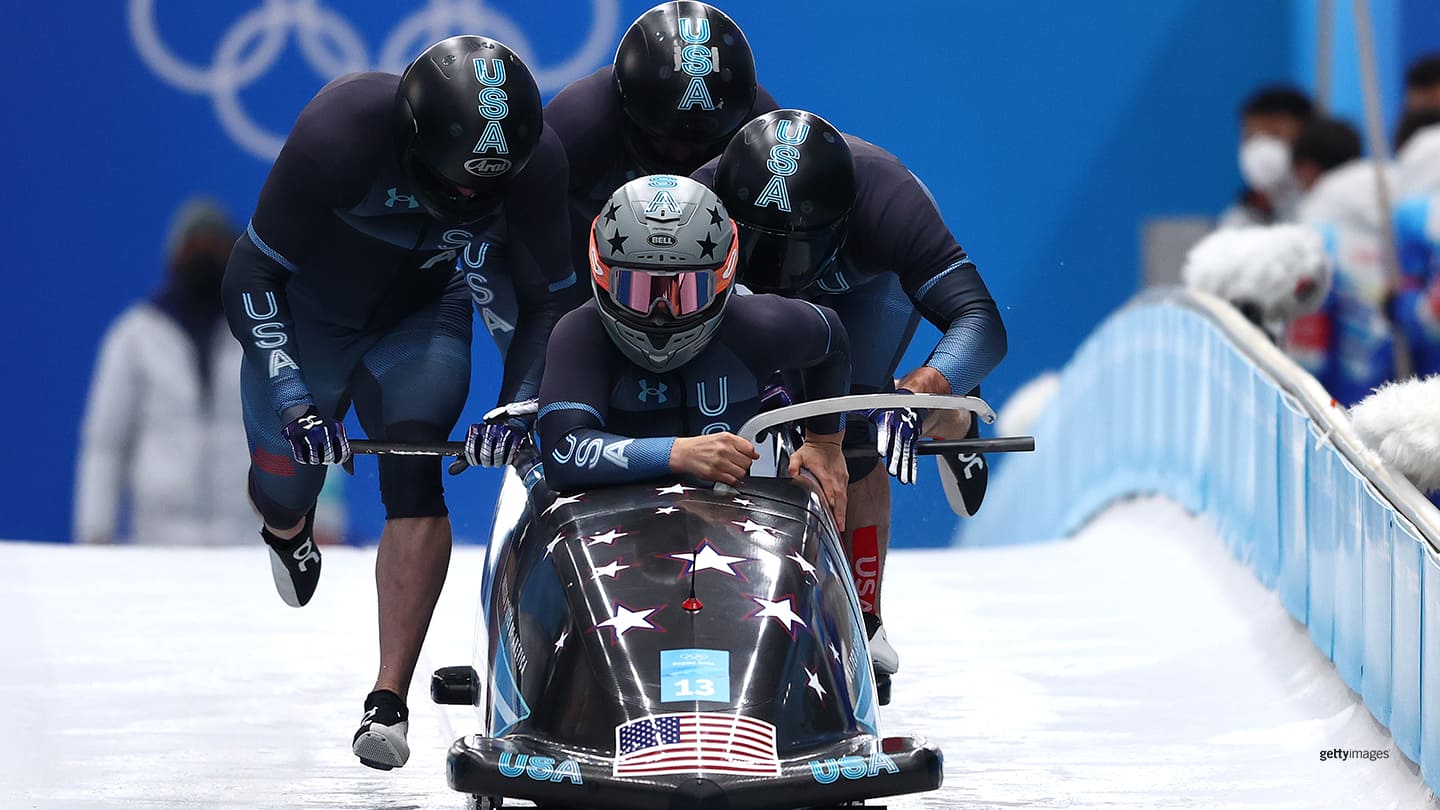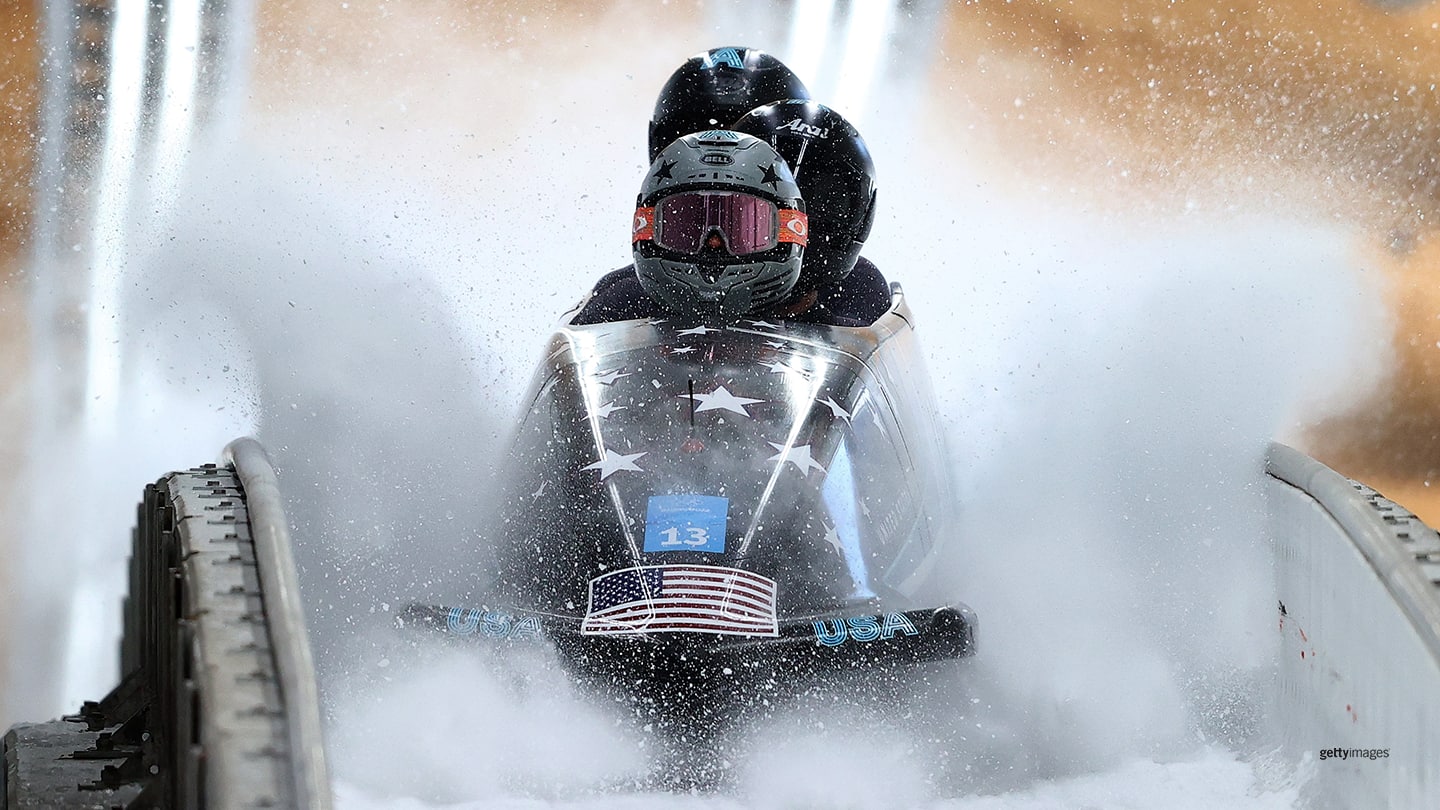
Olympian Kris Horn Finds The Calm, And Terror, At The Front Of The Bobsled
by Paul D. Bowker

(Front to Back) Hunter Church, Joshua Williamson, Kristopher Horn and Charlie Volker begin their run in the four-man bobsled heats during the Olympic Winter Games Beijing 2022 on Feb. 19, 2022 in Yanqing, China.
Kris Horn, a 2022 Olympian and former NCAA All-American decathlete, vividly remembers the first time he crawled into the pilot’s seat of a bobsled.
“It was absolutely terrifying,” he said.
“But I’ve never been so calm in my life despite how terrified I was,” Horn added. “It’s a weird kind of sensation. You can be scared all you want, but once you’re in the seat, once you go down, panicking is the worst possible thing for you.
“You have no choice but to just remain calm and get through it and stay on all four runners.”
Did we mention this all happens in a sled that goes at speeds upwards of 80 miles an hour as your body is slammed around like a rock in a cement mixer?
“It is very much not a smooth ride,” Horn said. “There’s definitely points in Lake Placid specifically where there’s just so much … kind of vibrations going through, I can’t really keep my vision steady, so it’s almost like I’m driving blind.”
The thing is, Horn couldn’t wait to get there.
Horn, a 2019 world championships bronze medalist, was on the push crew when he made his Olympic debut last year in a U.S. four-man sled in Beijing. Hunter Church was the pilot, and Horn teamed up with Josh Williamson and Charlie Volker for a 10th-place finish.
“Calm as a cucumber,” Horn said. “No nerves, no anxiety. Just focused and ready.”
A taste of the back of the sled in 2022 led Horn to the front of it this season. It also sent him back to the U.S. development squad in a two-man sled in the North American Cup instead of world cup events in the big sled. The idea is that a couple of seasons as a pilot could position Horn for a driving spot in the Olympic Winter Games Milano Cortina 2026.
Moving from the back to the front is a big change.
“It’s like a control thing, I guess,” he said. “When you’re in the back of the bobsled, you have no control over what happens. You give your push and that’s it. Your job is done. You sit there and go along for the ride.”

(Front to Back) Hunter Church, Joshua Williamson, Kristopher Horn and Charlie Volker finish their run in the four-man bobsled heats during the Olympic Winter Games Beijing 2022 on Feb. 20, 2022 in Yanqing, China.
Horn, 28, is piloting a two-man sled this season and hopes to graduate to both two- and four-man sleds next season.
“Exciting,” he said. “Definitely like nothing I’ve ever done. Exhausting.”
Horn had a pair of wins at the IBSF Push World Championships in December in Lake Placid, New York, which is also the home training center for the U.S. bobsled team. A few weeks earlier in Park City, Utah, Horn and his crews posted top-10 finishes at a North American Cup competition. Horn teamed up with Brandon Jetter for a seventh-place finish Nov. 18, and then combined with Paul Rabic for a sixth-place finish the next day.
Horn’s final competition of the season will be in late March, when Lake Placid hosts the North American Cup’s season finale. The two-man competition is March 23-24. But, the overall competition in skeleton and bobsled goes through March 27.
The transition from pushing to piloting has been a physical and emotional challenge. Bedtime comes early.
“I’m at home at like 7 o’clock, ready to pass out because I’m exhausted,” Horn said. “My brain is just fried.”
Feeding the brain, Horn said, is crucial to success. Not just the food, but the knowledge, one minute and one run at a time.
“Probably keeping your brain healthy, I’d say, is the biggest challenge,” Horn said. “Just making sure you have kind of the right nutrition to give your body the resources it needs to just keep going and going and going.
“You’ve got to get 10,000 hours to be an expert in anything, but due to the nature of the sport you don’t ever get that much time to practice bobsledding, especially the driver,” Horn added.
“You only do three runs a day, and each run’s maybe a minute or so, maybe a little less. I know some of the world cup pilots out there, the best of the best, they’ve been doing it for like 10-plus years, still learning, still trying to develop themselves.”
Once the season ends in Lake Placid, Horn will head back to his hometown of Pembroke, Massachusetts, a suburb located south of Boston where he competed in track and soccer at his high school and where his dad suggested bobsledding to Kris once his days at a decathlete were done at the University of Massachusetts in 2017.
“That’s when I kind of picked up bobsledding,” said Horn, a mechanical engineer who works at a global engineering firm in Boston. “I was like, ‘This is even better than decathlon.’”
Paul D. Bowker #
Paul D. Bowker has been writing about Olympic sports since 1996, when he was an assistant bureau chief in Atlanta. He is a freelance contributor to TeamUSA.org on behalf of Red Line Editorial, Inc.